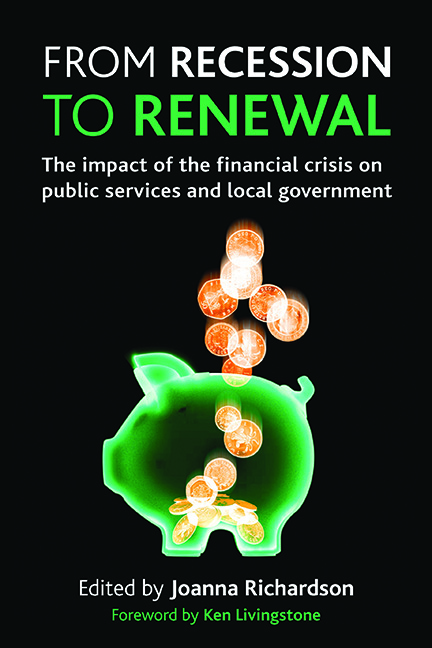 From Recession to Renewal
From Recession to Renewal one - Introduction: the scope and challenges of the financial crisis
Published online by Cambridge University Press: 01 September 2022
Summary
Dear chief secretary, I’m afraid there is no money. Kind regards – and good luck! (Byrne, 2010)
This book aims to analyse the impact of the financial crisis on public services and local government. Public debt in Britain is high1 and to tackle this, the Conservative–Liberal Democrat Coalition government elected in May 2010 confirmed immediate reductions in public expenditure in 2010/11. The general election, however, was fought on the basis of not ‘if ‘ but ‘when’, and by whom, such reductions would be made and how the consequences of these reductions would be managed. It is the impact for providers and users of public services, and more widely for government and governance, which will be explored in the book. This chapter will set out a brief historical context and outline some of the emerging debates, responses and concepts in the rest of the book.
The Governor of the Bank of England captured the essence of the frustration of many at the handling of the financial crisis:
never in the field of financial endeavour has so much money been owed by so few to so many. And, one might add, so far with little real reform. (King, 2009)
A number of government interventions, not only in Britain, but in the US and around the globe (see further Chapters Two and Three), sought to shore up the viability of the banks because of the view that they were ‘too big to fail’. The hold of the financial services sector over government actions from 2007 infuriated those who felt that similar support should be shown for the car industry and other key manufacturing industries such as steel, not forgetting small businesses too. The government supported the financial services sector, but the injection of public cash into the banks did not lead to increased liquidity, indeed loans to businesses were drastically curtailed, again hitting small business and individual home owners. The considerable support provided to the banks (effectively the nationalisation of private debt), at the expense of the taxpayer, resulted in only negligible change in behaviour by the banks. Indeed, the question of individual bonuses paid to some bankers, and the scare tactics of the loss of ‘the best’ of the banking industry if Britain enforced a regulatory cap on bonuses, indicated that little had changed.
- Type
- Chapter
- Information
- From Recession to RenewalThe Impact of the Financial Crisis on Public Services and Local Government, pp. 3 - 24Publisher: Bristol University PressPrint publication year: 2010


